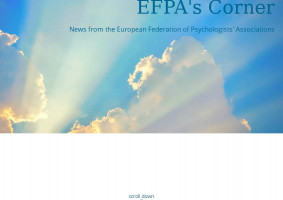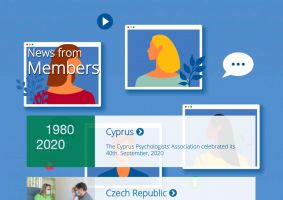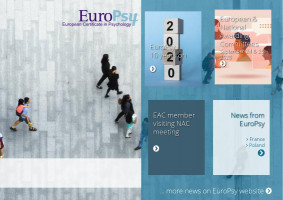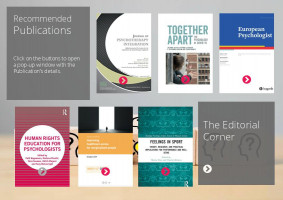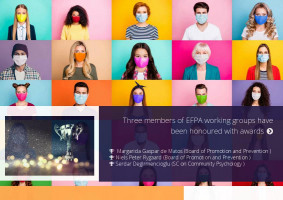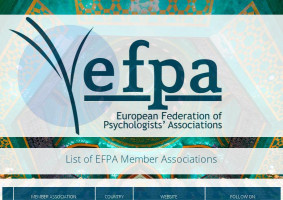What is EuroPsy?
Click here to
learn more
EuroPsy (or European Certificate in Psychology)
is a European standard of education, professional training and competence in psychology set by the European Federation of Psychologists’ Associations (EFPA).
Visit: www.europsy.eu

EuroPsy
10 years on
_w850_h878_1.jpg)
In 2020 we celebrate ten years of the implementation of the EuroPsy project. We are keen to document the impact that the EuroPsy has had on a national and international level for psychology across Europe. Therefore, we are currently preparing an article for publication, the aim of which is provide an overview and critical analysis of how the EuroPsy project has impacted on the development of psychology in Europe over the past ten years.
Specifically, the paper will focus on the impact of the EuroPsy on different levels (global, country level, university level, individual level); collaboration with international organisations, influence on legislation on psychology, curriculum development in Universities, and impact on professional practice. In order to achieve this, we have reviewed annual reports (2012-2020), which have been submitted each year from the National Awarding Committee and the Specialist National Awarding Committee of each member country.
It is evident from this analysis that the EuroPsy project has had a significant impact across Europe and major advancements have been made in developing the profession of psychology. For example, many member associations have been able to use the EuroPsy standards to lobby politicians to improve the standards of psychology education and training in their country, resulting in legislative change. There have also been a number of salient developments in supervision training and the development of supervision standards in many countries. It is hoped that this article will document the successes of EuroPsy in the past decade and outline the major developments which have been made across Europe in raising the standard of psychology education, training and practice.
European & National
Awarding Committees
September 24 & 25, 2020

The EAC held its third online meeting this year on 24th September, 2020. Although we are becoming accustomed to these online meetings, like you all, we miss meeting each other and being able to discuss our work in person. Chris Willis, the chair of the Provisional European Awarding Committee in Sports Psychology, described the work of the pilot project on sports psychology and we had a detailed discussion on the eligibility criteria for the specialist certificates.
While there are some differences between psychotherapy and work & organisational psychology specialisms (e.g. requirement for personal development work in psychotherapy), the EuroPsy regulations provide a template for ensuring consistency in standards at the specialist level of competence.
Eleni Karayianni, our liaison with the Executive Committee of EFPA joined us for an hour to share in the discussion.

On the 25th of September 2020 the European Awarding Committee (EAC) hosted the annual Chairs meeting for National Awarding Committees (NAC) and Specialist National Awarding Committees (SNAC). This meeting is usually held in Brussels in March of each year.
The 2020 meeting had been postponed due to the current pandemic. As it was unlikely, we were going to be able to meet in person this year, it was decided to proceed with a virtual meeting. While virtual meetings are not quite the same, this medium did facilitate a large attendance. The meeting was attended by representatives from almost all the EuroPsy countries; we also welcomed representatives from Malta, whose application is currently being processed and representatives from Ukraine and Serbia, both of whom are currently working on their application.
In addition to NAC and SNAC chairs and representatives from member associations, Christoph Steinebach, president of the European Federation for Psychologists Association and Eleni Karayianni, liaison between the EAC and the Executive Committee (EC) also attended.
Rosaleen McElvaney, chair of the EAC provided an update on developments since the 2019 chairs meeting, while updates on the Specialist European Awarding Committees (S-EACs) were provided by Nady van Broeck (psychologists specialising in psychotherapy) and Steve Woods (work and organisational psychology). The S-EAC in Psychotherapy is seeking another member; those interested should contact Nady or the EFPA Head Office. Chris Willis, chair of the Provisional European Awarding Committee on Sports Psychology reported on the work of the pilot project in sports psychology.
The committee is hoping to begin testing the provisional specialist certificate in a small number of countries in the new year. the pilot began with an overview of progress made and challenges which arose, throughout the year.
An extract from a video ‘In conversation with Ingrid Lunt and Ype Poortinga’ was played. This video is available to download from https://www.europsy.eu/news.
Rachael McDonnell Murray gave an overview of the project ‘The EuroPsy – ten years on’ looking at the impact of the EuroPsy on psychology in Europe. There was robust discussion and sharing of information among those attending. Hopefully we will be able to meet in person in 2021.
EAC member visiting NAC meeting

Taking part in UK’s NAC meeting was particularly reassuring and rewarding. In times of Covid, being able to zoom in and share ideas with colleagues from other European countries is particularly satisfying. Moreover, when that country has a long tradition of psychology and psychologists and has worked so hard to develop the EuroPsy standards. Garry Squires chaired the September the 8th Zoom meeting in which NAC members Helen Baron and Gary McPherson participated as well as Rachel Scudamore from BPS Quality Assurance and Standards, Natalie Billing from BPS Membership Enquiries and Laura Devlin from BPS Research and Impact Lead. Bridget Hanna, UK NAC member, was not able to attend. The documents that guided the meeting included the Current Regulations published in the UK in July 2019, as well as the 2018 EuroPsy Pamphlet and EuroPsy Implementation Guide.
The participants discussed how all applications are being monitored and how non-standard applications can be developed, if necessary. They also accounted for the various actions that have been taken towards the development of EuroPsy in the UK. Some members referred the intention of presenting EuroPsy and Specialist Certificates in future conferences and of raising awareness of EuroPsy via BPS undergraduate and postgraduate programme accreditation. The team also aims at aligning with EuroPsy competencies and giving EuroPsy information to applicants when sending out information about member networks and Divisions. Alignment of British Psychological Society (BPS, the UK Member association of EFPA) ’s developments with EFPA/EuroPsy was another topic that was reviewed, with particular emphasis on qualification and standards in three areas: training programmes, continuous professional development (CPD) and supervision.
These issues and all the others that were raised showed how all NAC and BPS participants are truly engaged in developing and promoting EuroPsy in the UK. The most outstanding facet of this meeting was the willingness to change actions in order to promote the EuroPsy and be aligned with its principles. The readiness to debate different perspectives and to share knowledge with EAC attests how UK NAC is a good example of progress of the EuroPsy. On my behalf, I thank Gary Squires and all the participants in the meeting for the invitation to attend it and their warm welcome. Through this exchange EAC is more aware of what is being done towards the development of EuroPsy across Europe.
News from EuroPsy
France
Poland
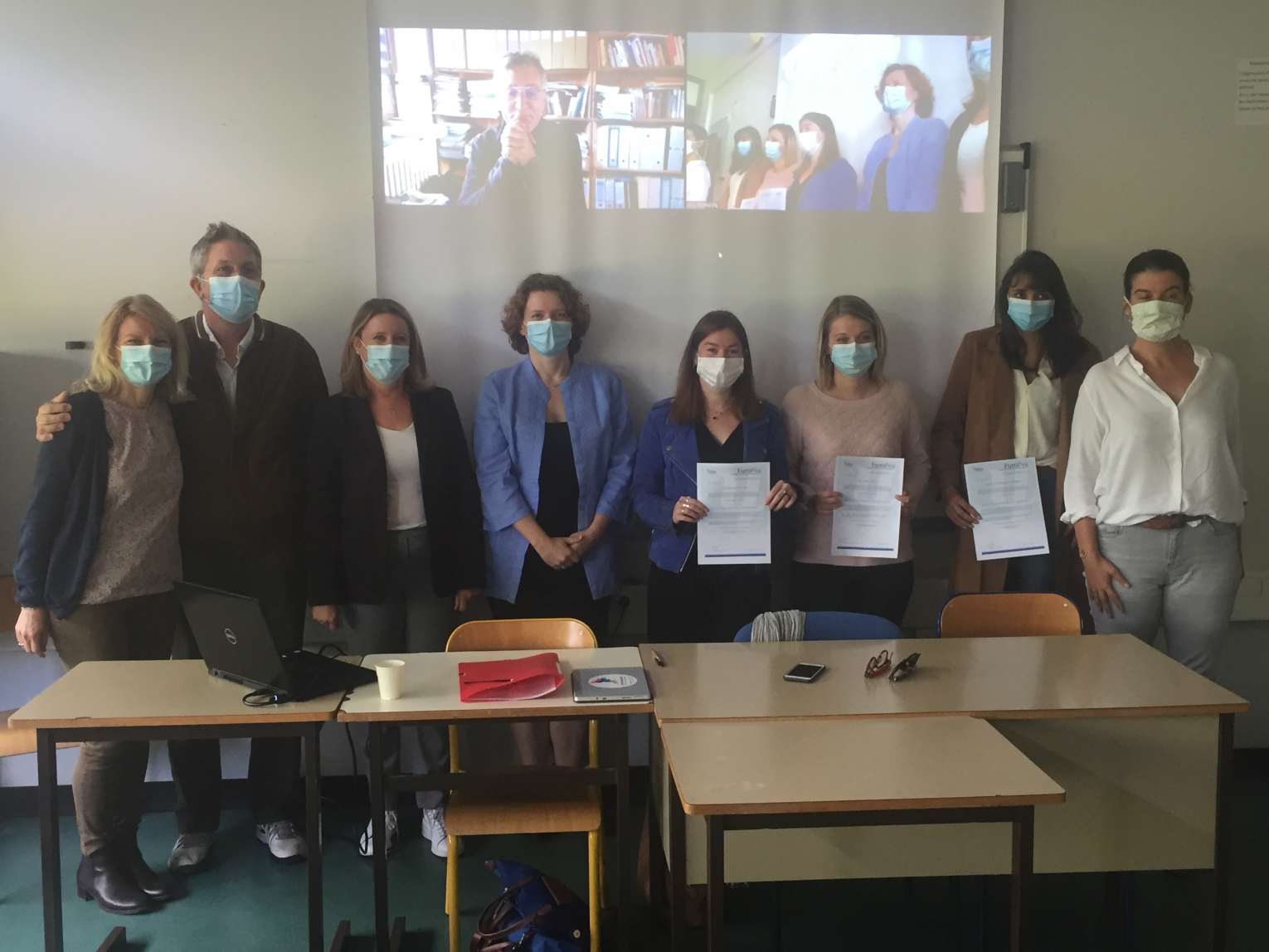
Adam Tarnowski, Polish NAC EuroPsy Member and Plenipotentiary for Cooperation with Universities, Associate Professor, Nicolaus Copernicus University in Torun, POLAND
Beata Krzywosz-Rynkiewicz, Head of Polish NAC EuroPsy, Associate Professor, University of Warmia and Mazury in Olsztyn, POLAND
In Poland, a professional career path in psychology formally complies with standards postulated by EuroPsy. Under the Psychology Profession Act of 2001, practitioners are formally required to complete a five-year university program in psychology and one year of post-gradual professional training. However, for reasons that extend beyond the scope of this article, an internship system does not exist in practice, and the status of legislative efforts to regulate the psychology profession can be described as ‘complicated’.
Recent changes on the educational market have also contributed to ambiguity in psychologist training. Until recently, a Master’s degree in psychology was awarded only to individuals who had completed a long-cycle five-year university programme. At present, a Master’s degree can be acquired under the Bologna Process in the system ‘3 (B.A.) + 2 (M.A.)’. The exact number of universities that offer programmes in psychology in Poland is difficult to determine, and it probably ranges from 80 to 100. These universities differ considerably in terms of staff, participation in research, and the offered programmes. In universities with long-standing traditions, members of the academic community have long sought for effective methods to promote high standards in psychology education.
The National Awarding Committee to grant EuroPsy certificate, has been faced with the challenge of evaluating the content of psychology curricula in the process of reviewing applications for each individual graduate. To eliminate this necessity, the NAC has invited Polish universities to participate in a certification programme referred to as the “certificate of consistency” to confirm that their psychology curricula are consistent with EuroPsy standards. Universities present the NAC with detailed information about their curricula, and NAC experts evaluate the programmes for compliance with EuroPsy requirements. Universities whose programmes conform to EuroPsy standards receive a “full” or “partial” certificate of consistency. A ‘partial” certificate implies that the university graduate should complete his/her education (e.g. specified number of internship hours).
In our opinion, the ‘certificate of consistency’ has been successfully established as a badge of quality in Polish universities that offer programmes in psychology. The certificate has been issued to the majority of Poland’s oldest institutions of higher education as well as private universities and newly-established universities that are committed to quality education. The graduates of ‘consistent universities’ are entitled to a considerable discount on the EuroPsy application fee, which is an additional incentive. The introduction of the discount was a logical measure because the programmes completed by these graduates do not have to be assessed by the NAC or have to be evaluated to a limited extent. As a result, students hoping to become EuroPsy certificate holders in the future began to put pressure on their universities to join the certification programme.
Unfortunately, professional ideals are not always easy to implement in practice. At present, only three of the thirteen evaluated universities have received full certificates of consistency. Partial certificates have been issued to the remaining institutions. Internship poses the greatest problem. Universities where psychology programmes generally meet the relevant standards are required to provide additional practical training, and until this requirement is met, graduates pursing a EuroPsy certificate have to seek internship opportunities on their own (universities are required to supervise this internship and guarantee that internships meet the appropriate quality standards). The second problem is the selection of optional courses that often exceeds the relatively narrow range of obligatory courses. As a result, students who have a clear idea as to what career path they want to pursue do not always receive an education that conforms to EuroPsy standards. In such cases, the NAC recommends that students keep individual study cards and choose optional courses that cover the basic topics in psychology education. Universities are also encouraged to appoint consultants who will assist students in planning individual education programmes.
The certificate of consistency continues to garner increasing recognition, but the fact that EuroPsy has emerged as a benchmark of quality in the professional community is the greatest cause for satisfaction because it eliminates the dire and often ineffective process of evaluating psychology curricula. As part of the efforts aiming to implement a new Act Regulating the Professional Practice of Psychology, members of the professional community can lobby for the introduction of the EuroPsy framework as the global core standards in the licensing process.

